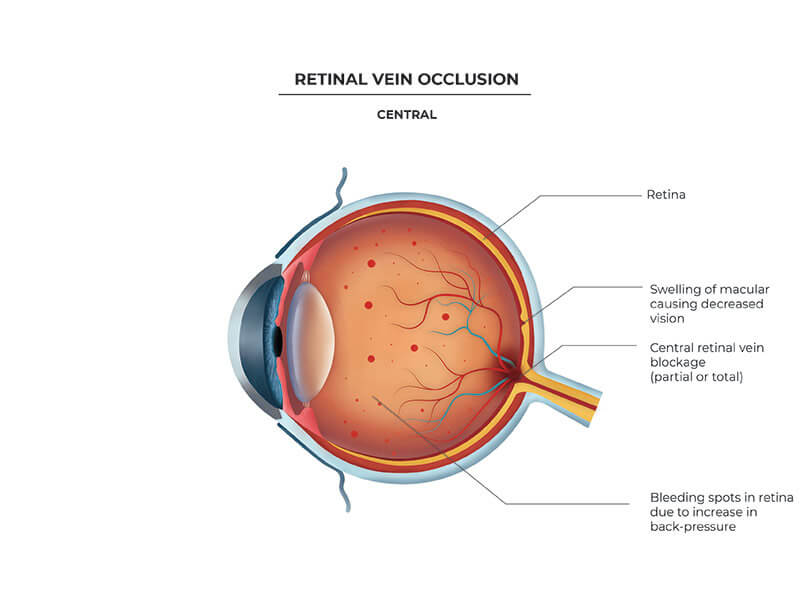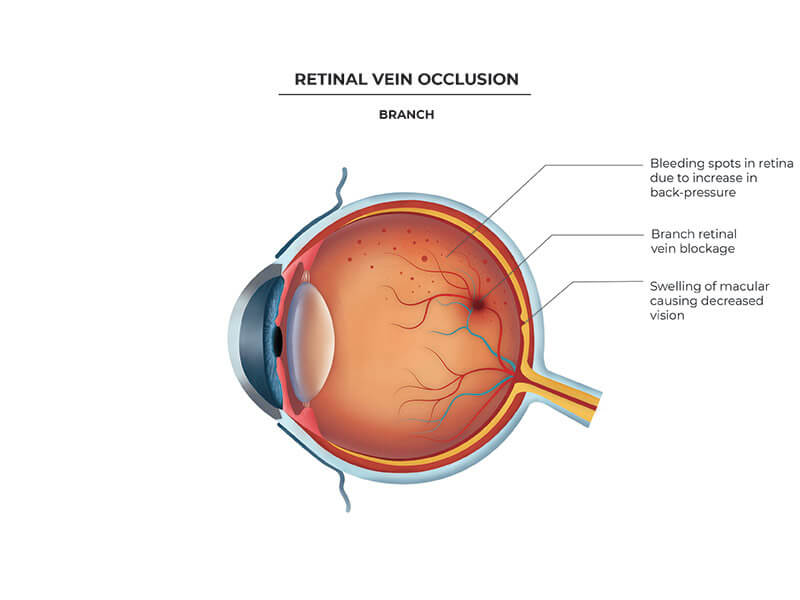Retinal Vein Occlusion
What is a retinal vein occlusion?
It is a total or partial blockage of a retina vein and causes decreased vision without any pain.
What causes a retinal vein occlusion?
A clot in the retinal vein results in complete or near-complete obstruction of blood flow. The pre-disposing risk factors are discussed below.
Prevention and systemic treatment
Treatment involves both systemic risk factor modification, done by your general practitioner or specialist, and treatment and monitoring of the eye, done by your ophthalmologist.
What is a retinal vein occlusion?
It occurs when a blood clot forms in a retinal vein and results in a reduction of vision without any pain or redness of the eye. The retina is the thin membrane that lines the inner surface of the back of the eye. It is similar to the film of a camera. Blockage of one of the veins draining blood out of the eye causes blood and other fluids to leak into the retina causing swelling as well as lack of oxygen. This interferes with the light receptor cells and reduces vision.
The condition is uncommon under the age of 60 but becomes more frequent in later life. There are two types of retinal vein occlusion:
- Central Retinal Vein Occlusion is due to obstruction of the main vein formed from the four branches.
- Branch Retinal Vein occlusions are due to obstruction in any of the retinal veins.
What causes a retinal vein occlusion?
A clot in the retinal vein results in complete or near-complete obstruction of blood flow. There are several risk factors which may increase the probability of a retinal vein occlusion occurring.
These include:
- High blood pressure
- High cholesterol
- Glaucoma
- Diabetes
- Smoking
- Obesity and sedentary lifestyle
- A number of rare blood disorders
Prevention and systemic treatment
It is essential to identify and treat any risk factors in order to minimize the risk to the other eye and prevent a further vein occlusion in the affected eye. Treatment of the following risk factors reduces the risk of a further vein occlusion in both eyes.
- High blood pressure: If your blood pressure is higher than 140/80 on several occasions, treatment is normally advisable.
- Raised blood cholesterol: Discuss diet modification with your general practitioner or dietician. Treatment with tablets is normally highly effective.
- Glaucoma: In this eye condition, the pressure in the eye is raised and can cause gradual loss of peripheral vision. It can also increase the risk of another retinal vein occlusion. Treatment with drops to reduce the pressure is normally highly effective at preserving sight and presenting further retinal vein occlusions.
- Diabetes: Retinal vein occlusions are more common amongst people with diabetes. Detection of diabetes and good control is essential in order to preserve vision
- Smoking: The more you smoke, the greater the risk of another vein occlusion. Ask your general practitioner if you need help to stop smoking
- Rare blood disorders: these are normally identified by simple blood tests. In the unlikely event that this is the case, treatment is supervised by a specialist in blood disorders


Treatment of the eye
Persistent swelling (edema) at the centre of the retina (the macula) is the main cause for decreased vision. Several treatment options exist, depending on the severity and amount of retinal ischemia caused by the vein occlusion.
- Intravitreal injections: these are usually the mainstay of treatment, and help to alleviate the macular edema as well as decrease the ‘drive’ in the eye for new vessel formation.
- Laser: This may assist at a later stage. Not everyone requires laser.
Are there any later complications?
In certain cases, the retina does not receive enough oxygen and produces a chemical factor which causes new blood vessels to grow on the retina and iris. This can cause high pressure in the eye which is painful and can lead to blindness. Timeous follow-up and treatment may help to prevent these new blood vessels from growing.
Will glasses help?
Not specifically. The reason for poor vision is macular edema, which is treated as discussed above.
Follow-up
Serial monitoring is required to monitor the health of the macula and retina, and its response to the vein occlusion. Follow-up will vary depending on severity and co-morbidities. You will be advised by Dr Lapere on each visit.